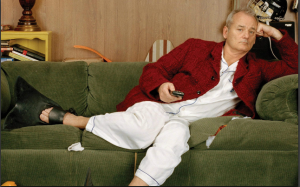Richard looks at Robert Schnakenberg’s The Big Bad Book of Bill Murray
 By Richard Crouse – Metro Canada
By Richard Crouse – Metro Canada
In the 1950s, author Robert Schnakenberg’s father was the letter carrier who delivered jazz legend Louis Armstrong’s mail. “Louis would say, ‘Hi Mr. Mailman’ and sometimes Louis and his wife would invite my dad in for coffee. That is sort of my claim to fame.”
It also began a career Schnakenberg says involves “lurking around the edges of famous people.” The author of more than a dozen books, including The Encyclopedia Shatnerica and Christopher Walken A-to-Z, Schnakenberg’s latest is The Big Bad Book of Bill Murray, a weighty tome analyzing the life and career of everybody’s favourite Ghostbuster.
“They’re more history books than puff pieces about celebrities,” he says on the line from his Brooklyn home. “I wanted to approach them from a quasi or mock academic perspective and treat them as if they were historic artifacts rather than just pop culture icons.”
Murray was a perfect subject for the pop historian. “I had done two previous A-to-Zs and was looking around for a third person to round out the trilogy. I had visions of a three volume slip case edition in my head.”
Murray fit the criteria. “Who has a long career? Who has left a paper trail of interviews and profiles? Who has an off-camera persona that is just as interesting as what they do onscreen? It just clicked last year. He reached a point of saturation with all these viral videos going around that (the publisher) said, ‘Let’s do the book now.’”
The volume provides an overview of Murray’s long and varied time in the public eye. From critical appreciations of his films, to interesting trivia, The Big Bad Book of Bill Murray spans decades of fascinating behaviour.
“His career provides a lot of entry points for people who want to get into him,” says Schnakenberg. “If you came of age in the ’70s, the way that I did, you remember the Saturday Night Live version of Bill Murray. If you were 13 in 1984 you probably think of him as Ghostbusters Bill Murray. If you were a proto-hipster in the ’90s your image is probably the guy in all the Wes Anderson movies. Now people know him as the dishevelled guy who crashes people’s parties.”
The point is, for almost forty years Bill Murray has been a constant in our lives. “Bill Murray never had to come back because he never went away,” says the author. “He was always cool; just cool in different forms over the years.”
